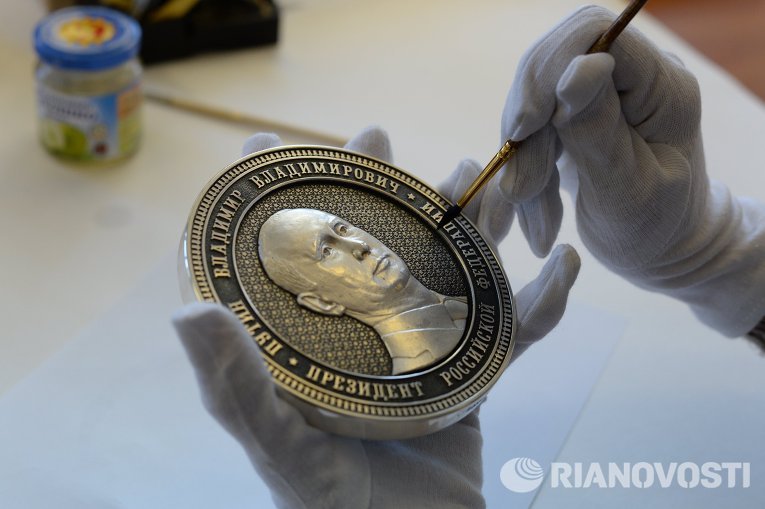Until recently, Vladimir Putin’s story of the Crimean crisis was one of an oppressed people breaking free, with the heartfelt support of a brotherly Russian army, from the clutches of a Neo-Nazi junta which allegedly seized power in Ukraine as a result of a coup d’état. The official Kremlin version of the story has cost millions of unofficial US dollars, which were spent on a gargantuan propaganda machine which has worked overtime to convince the international community of the authenticity of this perspective on Russia’s Crimean escapade.
On April 10, 2014 in a four-hour televised heart-to-heart “chat” with the Russian people, Vladimir Putin personally reiterated this account of the struggle for Crimean “self-determination”. When asked about his decision to get involved in the Crimean crisis, he replied that “Russia has never planned annexation or military action in the Crimea, […], when Crimeans started talking about his desire of self-determination, then, of course, we started thinking what we should do. And it was then, but not some 5-10-20 years ago, when it was decided to support Crimeans”.
And Putin’s version of the Crimean story, thus told, would have remained – at least for those who generally tend to believe him – valid, had it not suffered a devastating blow from a completely unexpected turn of events.
On March 25, 2014 the Russian Minister of Defense Sergei Shoigu presented the self-proclaimed Prime Minister of Crimea Sergei Aksyonov, together with the command of the Russian Black Sea Fleet, with a medal “For the Return of Crimea”. The award, as reported by the media, had been instituted by the Russian MOD to commemorate the reunification of the Crimean people with their historic motherland.
While news of the medal “For the Return of Crimea” struck most pro-Ukrainian observers as yet another event in the Kremlin’s cynical neo-imperial farce, it soon disappeared from the headlines, overshadowed by concerns over growing separatism and instability in the East of Ukraine.
The story of the infamous medal was unexpectedly resurrected a week ago by a little-known Ukrainian activist, Vladimir Prosin, who posted on his Facebook page a photo of the award’s reverse side. To the shock of many observers and experts, the image showed an inscription of the exact dates of the Russian Federation’s campaign for the return of Crimea: 20 February – 18 March 2014.
To appreciate the magnitude of this almost accidental discovery, one needs to recall the state of Ukraine on February 20, 2014 – the official date, according to the Russian MOD, of the beginning of its Crimea campaign.
On that historical day, Ukraine’s now-fugitive President Yanukovych was still legitimately in power; the Crimean people were going about their daily businesses without a shadow of a thought about their urge for “self-determination”; and, what makes the story most sickeningly immoral and cynical, unarmed Ukrainian protesters were lying breathless in puddles of their own blood in the center of Kyiv, the majority shot in the head by Yanukovych’s snipers.
Putin’s “historic mission” to bring Crimea back to Russia’s fold, it seems, began one month before the Crimean people expressed their wish to rejoin Russia at a referendum, three days before President Yanukovych fled the country, and minutes before the mass murder of unarmed Euromaidan protestors.
Looking at the dates on the medal through the prism of these facts, a judge at the International Criminal Court in Rome would be inclined to conclude that what Mr Putin called “an unexpected decision”, based on the freely expressed desire of the local population”, was, in reality, premeditated military aggression based on manipulative propaganda and brutal lies.
In strictly legal terms, according to the norms and conventions of international criminal law, the Russian Federation (and its leadership), stands suspected of committing a crime of aggression against a sovereign country on a false pretext.
Over the last two months the Kremlin’s propaganda machine has gone out of its way to try to convince the world that the crisis in Crimea was the result of the coming to power of a Neo-Nazi Russia-hating junta. Yet as the dates on the medal show, the operation to annex Crimea in fact began three days before the new Ukrainian government was formed.
More importantly, by referring to February 20, 2014 as the date of the beginning of the Crimea campaign, Russia inadvertently confesses that the shooting of innocent people on Maidan was the first stage of the military aggression. This implies that the mysterious unidentified snipers behind the Maidan slaughter were Russian soldiers on a historic mission for their motherland.
Alternatively, the coincidence of the date of the beginning of the Crimea campaign matching the date of the mass killing of the protesters in Kyiv indicate that Putin is a deranged sadistic psychopath who chose the date on the medal to deliberately insult the Ukrainian people. And considering that he took Euromaidan’s victory as his personal defeat, this line of reasoning seems entirely plausible.
The Russian MOD, interestingly, has not yet commented on the scandal stirred up by the medal. On the contrary, it hastily removed from its website (and from Google’s cache) photos of the medal and the original press release which it had posted on March 24, 2014 to announce the granting of the award.
This, however, is not a scandal that Putin should be allowed to just sit out. He should either present the world with a viable explanation of the Crimean medal epic blunder, or he should start contacting attorneys who would be willing to defend him at the International Criminal Court on charges of crimes of aggression and crimes against humanity.
Yuriy Sak
PhD in Law (human rights)
Civil activist




